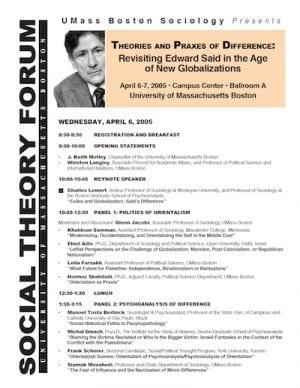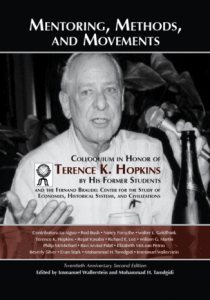Proceedings Journal Article — Orientalism as Praxis — by Hormoz Shahdadi
$15.00
Orientalism, I propose, is an academic and institutional, therefore, socially structured Praxis. This praxis is rooted in two epistemological foundations: the first foundation is the ontological paradigm of positivism of science itself; and, the second, the “socialized self” of the Orientalist—his consciousness—which is one necessarily framed by the “oppositional” attitude. In terms discussed, the only solution seems to originate in total rejection of domination—the Master/Slave relation of consciousness—and its substitution with Kantian Categorical Imperative: extension of the self to include all other selves as one’s own. Such universalism, of course, can be a strategy for research and analysis.
Description
Abstract
As an empirical phenomenon, difference is subject to a multiplicity of interpretations. In this paper I argue that the phenomenon of difference cannot be studied, as modern positivism and scientific approach assert, in a value neutral way. Difference, in the case of human agents, requires a special humanistic attitude. Otherwise, the cognitive operation involved would imply a “power differential” which in turn would result in relation of domination and the division into independent and autonomous (the observer) and dependent and subordinate (the observed). Orientalism, I propose, is an academic and institutional, therefore, socially structured Praxis. This praxis is rooted in two epistemological foundations: the first foundation is the ontological paradigm of positivism of science itself; and, the second, the “socialized self” of the Orientalist—his consciousness—which is one necessarily framed by the “oppositional” attitude. In terms discussed, the only solution seems to originate in total rejection of domination—the Master/Slave relation of consciousness—and its substitution with Kantian Categorical Imperative: extension of the self to include all other selves as one’s own. Such universalism, of course, can be a strategy for research and analysis.
Recommended Citation
Shahdadi, Hormoz. 2005. “Orientalism as Praxis.” Pp. 75-82 in Theories and Praxes of Difference: Revisiting Edward Said in the Age of New Globalizations: Proceedings of the Second Annual Social Theory Forum, April 6-7, 2005 (Discourse of Sociological Practice, Vol. 7, Issues 1&2, Fall/Spring 2005). Double-Issue Guest Editor: Mohammad H. Tamdgidi. Sociology Department, UMass Boston.
Read the Above Publication Online
To read the above publication online, you need to be logged in as an OKCIR Library member with a valid access. In that case just click on the large PDF icon below to access the publication. Make sure you refresh your browser page after logging in.







